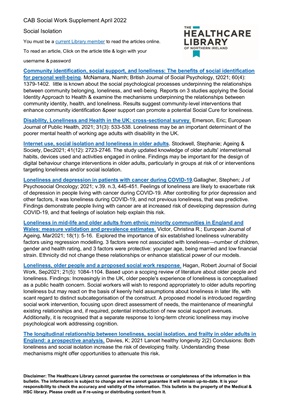
CAB Social Work Supplement April 2022
Social Isolation
You must be a current Library member to read the articles online.
To read an article, Click on the article title & login with your
username & password
Disclaimer: The Healthcare Library cannot guarantee the correctness or completeness of the information in this
bulletin. The information is subject to change and we cannot guarantee it will remain up-to-date. It is your
responsibility to check the accuracy and validity of the information. This bulletin is the property of the Medical &
HSC library. Please credit us if re-using or distributing content from it.
Community identification, social support, and loneliness: The benefits of social identification
for personal well-being. McNamara, Niamh; British Journal of Social Psychology, t2021; 60(4):
1379-1402. little is known about the social psychological processes underpinning the relationships
between community belonging, loneliness, and well-being. Reports on 3 studies applying the Social
Identity Approach to Health & examine the mechanisms underpinning the relationships between
community identity, health, and loneliness. Results suggest community-level interventions that
enhance community identification &peer support can promote a potential Social Cure for loneliness.
Disability, Loneliness and Health in the UK: cross-sectional survey. Emerson, Eric; European
Journal of Public Health, 2021; 31(3): 533-538. Loneliness may be an important determinant of the
poorer mental health of working age adults with disability in the UK.
Internet use, social isolation and loneliness in older adults. Stockwell, Stephanie; Ageing &
Society, Dec2021; 41(12): 2723-2746. The study updated knowledge of older adults' internet/email
habits, devices used and activities engaged in online. Findings may be important for the design of
digital behaviour change interventions in older adults, particularly in groups at risk of or interventions
targeting loneliness and/or social isolation.
Loneliness and depression in patients with cancer during COVID-19.Gallagher, Stephen; J of
Psychosocial Oncology; 2021; v.39. n.3, 445-451. Feelings of loneliness are likely to exacerbate risk
of depression in people living with cancer during COVID-19. After controlling for prior depression and
other factors, it was loneliness during COVID-19, and not previous loneliness, that was predictive.
Findings demonstrate people living with cancer are at increased risk of developing depression during
COVID-19, and that feelings of isolation help explain this risk.
Loneliness in mid-life and older adults from ethnic minority communities in England and
Wales: measure validation and prevalence estimates. Victor, Christina R.; European Journal of
Ageing, Mar2021; 18(1): 5-16. Explored the importance of six established loneliness vulnerability
factors using regression modelling. 3 factors were not associated with loneliness-number of children,
gender and health rating, and 3 factors were protective: younger age, being married and low financial
strain. Ethnicity did not change these relationships or enhance statistical power of our models.
Loneliness, older people and a proposed social work response. Hagan, Robert Journal of Social
Work, Sep2021; 21(5): 1084-1104. Based upon a scoping review of literature about older people and
loneliness. Findings: Increasingly in the UK, older people's experience of loneliness is conceptualised
as a public health concern. Social workers will wish to respond appropriately to older adults reporting
loneliness but may react on the basis of keenly held assumptions about loneliness in later life, with
scant regard to distinct subcategorisation of the construct. A proposed model is introduced regarding
social work intervention, focusing upon direct assessment of needs, the maintenance of meaningful
existing relationships and, if required, potential introduction of new social support avenues.
Additionally, it is recognised that a separate response to long-term chronic loneliness may involve
psychological work addressing cognition.
The longitudinal relationship between loneliness, social isolation, and frailty in older adults in
England: a prospective analysis. Davies, K; 2021 Lancet healthy longevity 2(2) Conclusions: Both
loneliness and social isolation increase the risk of developing frailty. Understanding these
mechanisms might offer opportunities to attenuate this risk.